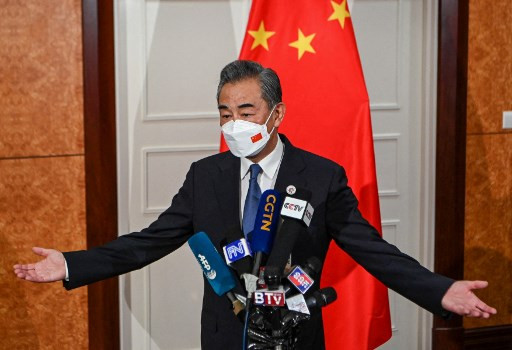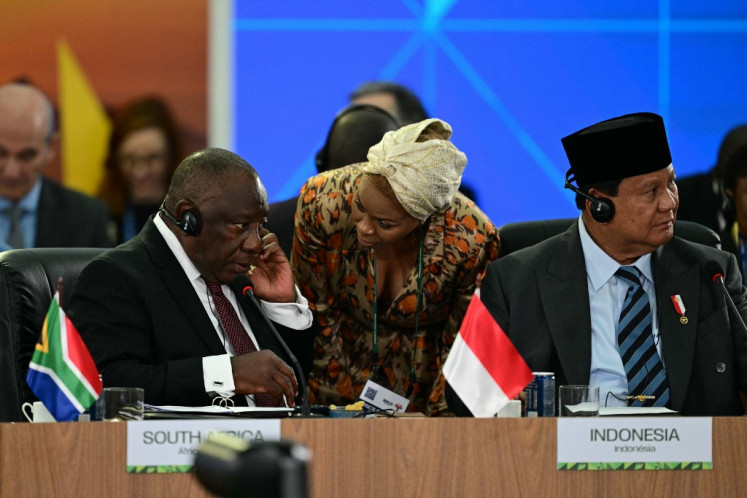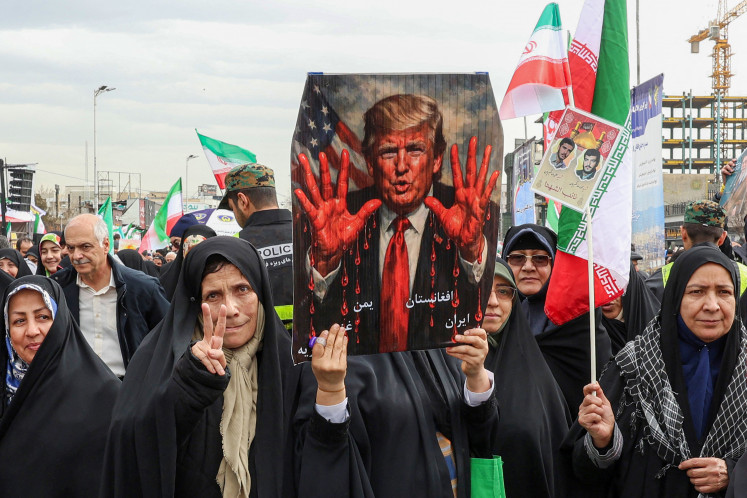Popular Reads
Top Results
Can't find what you're looking for?
View all search resultsPopular Reads
Top Results
Can't find what you're looking for?
View all search resultsASEAN-China comprehensive strategic partnership: A political perspective
It is important that ASEAN and China continue to work together to overcome challenges of mutual concern, if they are to make sure the newly elevated comprehensive strategic partnership goes beyond polite diplomatic statements.
Change text size
Gift Premium Articles
to Anyone
 Chinese Foreign Minister Wang Yi takes part in a press conference on the sidelines of the East Asia Summit foreign ministers' meeting in Phnom Penh on Aug. 5. The EAS ministerial descended into heated debate and several ministers staged walkouts, according to regional sources with knowledge on the matter. (AFP/Tang Chhin Sothy)
Chinese Foreign Minister Wang Yi takes part in a press conference on the sidelines of the East Asia Summit foreign ministers' meeting in Phnom Penh on Aug. 5. The EAS ministerial descended into heated debate and several ministers staged walkouts, according to regional sources with knowledge on the matter. (AFP/Tang Chhin Sothy)
Since becoming an ASEAN Dialogue Partner in 1996, China has deepened its relations with the regional bloc throughout the years. In 2021, ASEAN and China elevated the relationship to the level of Comprehensive Strategic Partnership (CSP).
There are many prospects the two sides can reap, especially in economic and people-to-people cooperation. However, from the political angle, the partnership has barely made a difference. Both ASEAN and China still have a lot of work to do in order to build mutual trust and confidence.
Elevating to the level of CSP shows the commitment of ASEAN and China to deepening relations. It emphasized that the relations between ASEAN and China would go to another level with holistic cooperation in almost all fields of cooperation.
Nevertheless, this does not necessarily offer much of a prospect, especially in the scope of political-security cooperation according to the Joint Statement of the Special Summit back in November 2021 (ASEAN Secretariat, 2021). Politically speaking, according to the statement, it is the usual reaffirmation to support each other’s independence and sovereignty as well as various rhetorical statements of preserving peace and stability in the region.
Beyond the statement, it is observed that ASEAN and China have cooperated comprehensively throughout the years. The economic engagement between the two has increased alongside the exchange of leadership visits and meetings as well as people-to-people connectivity. Unlike other powers, China’s top leadership has shown keen interest to meet with ASEAN counterparts at various levels.
Nevertheless, it cannot be ignored that there is still a trust deficit going on within the engagement between ASEAN and China. According to ISEAS’ State of Southeast Asia Survey in the last couple of years (2019-2022), many scholars and observers in the region recognized that China is indeed the most influential in the region, but at the same time a threat.
Why, despite the deep engagement, has the perception among ASEAN peoples of China as a threat not faded away?
First of all, there are many thorny issues that ASEAN and China have not completely resolved.
Some ASEAN countries still have an ongoing dispute over maritime territorial claims in the South China Sea. So far, there are some dispute-management mechanisms, like the Declaration of the Conduct of the Party of the South China Sea (DOC); and negotiation toward a more legally binding Code of Conduct (COC) is in motion.
Yet, there are still issues surrounding this matter; and sometimes, there were skirmishes between China and some ASEAN claimants at the South China Sea (CNN Philippines, 2022; Mastro, 2020).
Beyond the issue regarding the sea, there is a growing concern over the Mekong River transboundary management. Hydropower dams built in the upstream river have been alleged as one of the causes of a shortage of water during the drought in some ASEAN countries a few years ago (Lovgren, 2019). Throughout the years, there has been a debate about whether the Mekong issue is the next South China Sea dispute.
All of these unsettled problems may erode the trust of some ASEAN member-states in China.
Second, the spill-over effect from the United States-China rivalry could undermine the confidence of ASEAN member-states in their northern neighbor. It is general knowledge that the US and China are now in a fierce competition mode in the global arena. Southeast Asia is no exception.
Among ASEAN countries, for years now, there have been concerns that the two superpowers push them to take sides (Radio Free Asia, 2022). Lately, both the US and China usually assure ASEAN countries that they do not want any countries to take a side; but through diplomatic discourses, both powers have presented indirect pressure by framing their own agenda as good, and the other as bad.
This competition has serious implications on the unity and centrality of ASEAN in the future, and could perhaps deteriorate the relations between ASEAN and China as well.
However, there are still feasible ways to strengthen the implementation of the China-ASEAN Comprehensive Strategic Partnership, especially in political-security cooperation.
First of all, both ASEAN and China should continue to have a frank and open discussion and find solutions to the ongoing issues, like the South China Sea and the Mekong River.
A clear-cut settlement may not be achieved immediately; but during the negotiation, there should be a risk-reduction mechanism to respond in a timely manner, if any issues occur. The mechanism could be in the form of a hotline from the ground connecting to Beijing and other ASEAN countries’ capitals.
Furthermore, there should be a regular working group of ASEAN-China relevant authorities with the collaboration of track-II institutions in order to identify and discuss any arising challenges in those hotspots.
Second, beyond cooperation under the lens of solving issues, deepening the comprehensive strategic partnership between ASEAN and China should not be exclusive. China and ASEAN should open the space for cooperation with other dialogue partners within ASEAN-led platforms, like ASEAN Plus Three (APT), ASEAN Regional Forum (ARF) and East Asia Summit (EAS), especially regarding issues of common concerns, like non-traditional security issues, including climate and public health. Furthermore, cooperation to push forward the implementation of the Five-Point Consensus on the Myanmar Crisis should be an area of cooperation between ASEAN, China and other Dialogue Partners. With this inclusiveness, it would mitigate any negative perceptions toward the partnership between ASEAN and China.
In the current geopolitical context, building trust and confidence is important. If trust and confidence were to collapse, it would jeopardize other aspects of cooperation between ASEAN and China.
***
The writer is a researcher at the Cambodian Institute for Cooperation and Peace.










